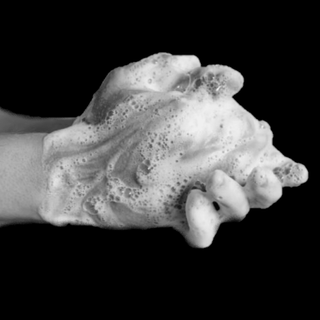
What Is Munchausen Syndrome? A Quick Introduction
From prestige television to the recent armchair diagnosis of a popular actress — Munchausen syndrome has captured public attention.

Munchausen syndrome, a rare but fascinating psychological disorder, has once again captured pop-culture imagination after a journalist recently asserted actress Jameela Jamil has the condition. This armchair diagnosis (which Jamil has laughed off), however, is a lot less interesting than the disorder itself, which has been the subject of both TV shows like 2018’s Sharp Objects and The Act (2019), as well as a 2017 documentary about arguably the most famous case — upon which The Act is loosely based. So, what is Munchausen syndrome?
What is Munchausen syndrome?
Munchausen syndrome is a severe form of a psychological disorder known as a factitious disorder. In milder forms, factitious disorder may present by, say, exaggeration of actual symptoms. Munchausen, however, is characterized by pretending to be ill or disabled for attention or actively attempting to become ill or disabled for attention. This may include faking psychological or physical symptoms, faking or tampering with medical tests, or actively sabotaging one’s health — for instance, “deliberately infecting a wound by rubbing dirt into it,” according to the U.K.’s National Health Service. To perpetuate the charade, people with Munchausen syndrome may willingly undergo unnecessary and risky treatments, such as unnecessary chemotherapy or surgery. They may also fake different illnesses under the care of different health care providers simultaneously.
The syndrome is named after the fictional Baron Munchausen (inspired by a real-life German nobleman), a character invented by Rudolf Erich Raspe, an 18th-century German author. The fictional baron told wildly implausible tales, thus inspiring the name for the disorder when it was first recognized in the 1950s.
Munchausen syndrome is also informally known as “hospital addiction syndrome, thick chart syndrome or hospital hopper syndrome.”
What is Munchausen syndrome by proxy?
Munchausen syndrome also exists as severe factitious disorder that manifests as a form of abuse — generally, a form of child abuse, or abuse of an aged or otherwise vulnerable person, according to the University of Michigan’s health portal. In this version, known as Munchausen syndrome by proxy, a parent, guardian, or caregiver fakes or purposefully causes an illness or disability — for example, by poisoning — in the person under their care. The most well-known, real-life example of this is the case of Dee Dee Blanchard, an American woman who for years forced her daughter, Gypsy Rose, to pretend to be mentally and cognitively disabled and chronically ill. She also subjected the girl to needless surgeries and treatments. Blanchard’s likely disorder was brought to light when her daughter orchestrated (and was later convicted of) her murder.
Related on The Swaddle:
We Need to Reframe Mental Health as a Social Justice Issue, Not a Personal Problem
What is Munchausen syndrome by internet?
Munchausen by internet is a relatively new iteration of the factitious disorder, enabled by the rise of virtual environments. It is characterized by a healthy person faking their medical history or faking symptoms of a physical or psychiatric condition they do not have via an online identity. This is typically found within online support groups dedicated to these medical conditions. Munchausen by proxy by internet is similar, but involves seeking online support and attention for fake caregiving for an imaginary, ill person.
Unlike the two conditions above, Munchausen by internet and by proxy by internet are not recognized by the American Psychiatric Association in the most recent edition of its Diagnostic and Statistical Manual of Mental Disorders (DSM-V). But researchers have collated case studies, suggesting this is a phenomenon of the internet age, if not (yet, or ever) diagnosable psychological disorders.
Why would someone pretend to be ill?
Munchausen syndrome and Munchausen by proxy are not scams in the traditional sense; people with these conditions aren’t out to take advantage of sick leave from work, prescriptions for pain medication, disability payouts, or other benefits for the ill, the injured, or their caregivers.
Instead, in cases of Munchausen disorder, the goal of the manipulation seems to be getting attention and care. In cases of Munchausen by proxy, experts think the motivating force is control. And while both versions of Munchausen involve planning and enacting deceit, ultimately, it’s not a calculated deception; according to the Mayo Clinic, individuals who suffer from either condition are unable to control their behavior.
What causes Munchausen syndrome and its proxy?
The causes of Munchausen syndrome and Munchausen by proxy are unknown. That said, researchers have identified risk factors associated with the conditions — but such factors are neither the conclusive causes of these conditions, nor guarantees that individuals who experience the risk factors will develop the conditions.
Risk factors for the syndromes include, per various expert resources:
- childhood trauma or abuse; this could include parental neglect or abandonment, or emotional, physical, or sexual abuse
- previous experience with illness and receiving attention for it, especially a serious illness in childhood
- personality disorders, especially antisocial personality disorder, borderline personality disorder, and narcissistic personality disorder
- depression
- employment in the field of health care
- a weak sense of identity and/or low self-esteem
What are the symptoms of Munchausen syndrome and its proxy?
According to various expert sources, symptoms of Munchausen include:
- Above-average knowledge of medical terms, conditions, and procedures
- Vague or inconsistent symptoms; alternatively, a “textbook” list of convincing symptoms
- Symptoms that worsen without apparent cause, or that don’t respond to standard treatments
- Frequent hospitalization and/or procedures and surgeries, with few visitors
- Eagerness for frequent testing or dangerous medical procedures
- Tampering with test results
- Claiming a complex, confusing, and/or serious medical history with little or no supporting evidence
- Arguing with health care staff
According to the University of Michigan health system, symptoms of Munchausen by proxy include:
- A background in health care, medical skills, or medical experience
- Above-average devotion to the person under their care (usually a child)
- Seeking sympathy and attention for their care of the other person
- Needing to feel powerful and/or in control
- Cultivating friendliness and closeness with health care staff
Related on The Swaddle:
Caregivers of People Living With Mental Health Conditions Need Care, Too
How common is Munchausen syndrome and its proxy?
As extreme versions of factitious disorder — already an uncommon disorder — both Munchausen syndrome and Munchausen by proxy are very rare. Some experts say the conditions may be more prevalent than recorded cases because of the difficulty in diagnosing them. Other experts argue the conditions may be overdiagnosed, as it’s not uncommon for one person with Munchausen syndrome or Munchausen by proxy to fake identities or to pretend different illnesses under the care of multiple health care providers at the same time.
The relatively few cases studied so far are concentrated among women, who typically have a background in health care and are aged between 20 and 40, and unmarried men, aged 30 to 50.
Why are the conditions difficult to diagnose?
Both conditions are characterized in large part by fraud. People with Munchausen syndrome and Munchausen by proxy are skilled manipulators, according to the NHS. If their lying is discovered, they often move, create a new identity, and seek out a new health care provider, making it difficult for the original health care provider to continue contact, gather evidence, and make a proper diagnosis. Even when that is possible, according to the NHS, most people with Munchausen or Munchausen by proxy deny they have a problem and refuse diagnosis and treatment.
Can Munchausen be treated?
Yes, but it requires the person with Munchausen or Munchausen by proxy to admit their mental illness, which is difficult for them to do, even when confronted with documented proof of their deception and/or their or their ward’s good health.
Treatment, when it’s possible, usually involves psychotherapy and cognitive behavior therapy, according to the Mayo Clinic. In some cases, medication for any other, co-occurring mental health conditions may be helpful.
How can you help a victim of Munchausen by proxy?
This is a very complicated question, with no clear-cut answer. Among other complexities, it matters greatly whether the victim is a minor or an adult.
In general, experts do not suggest outright confrontation of anyone with Munchausen, as it could make the individual defensive and cause them to cut ties — or, in the case of Munchausen by proxy, endanger or worsen the abuse of the victim.
If Munchausen by proxy is suspected, experts from the University of Michigan health system suggest:
- Keeping a journal recording the details and/or frequency of the child’s (or victim’s) symptoms, emergencies, hospitalizations, and treatments
- Consulting a medical professional about your concerns and the above journal
- Consulting child protective services (in the case of suspected child abuse) or an organization that promotes the rights of the victim (e.g. in the case of elder or other abuse)
Liesl Goecker is The Swaddle's managing editor.
Related


The Psychology of Catfishing
